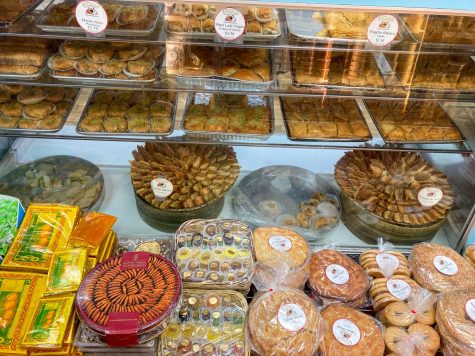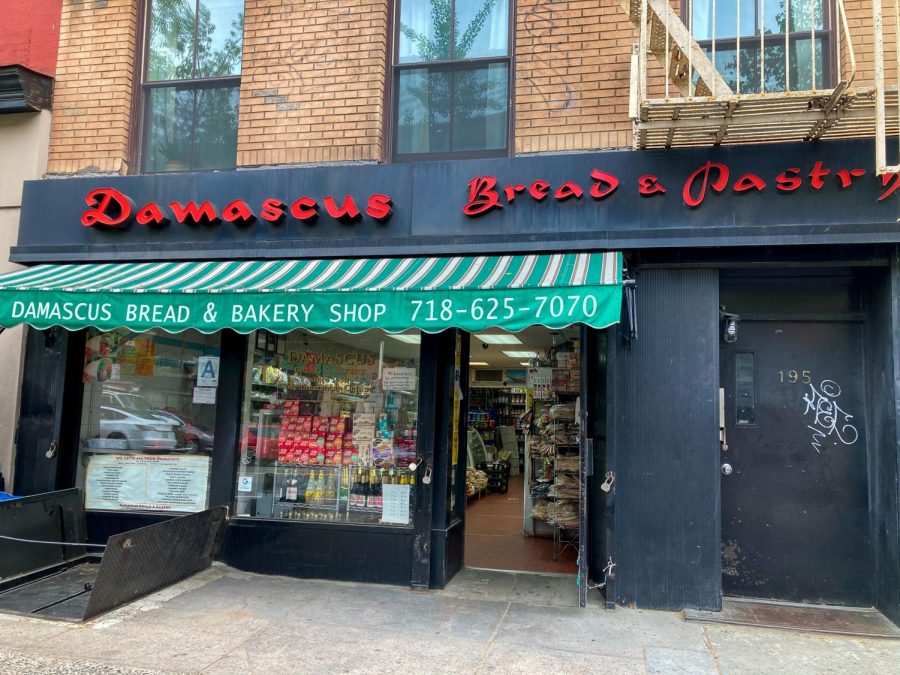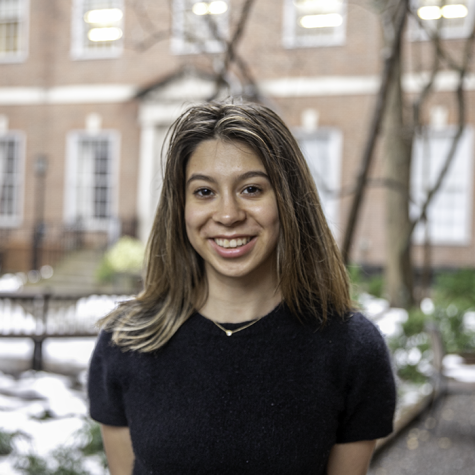Reconnecting with my Iraqi roots at Damascus Bread & Pastry Shop
Damascus Bread & Pastry Shop in Brooklyn is a community favorite among many people of both Middle Eastern and non-Middle Eastern descent.
Damascus Bread and Pastry Shop, located on 195 Atlantic Avenue in Brooklyn, is a Syrian bakery known for its flatbreads, pastries, dips, and spreads. This bakery has been serving its community since its opening in 1928. (Staff Photo by Gabby Lozano)
May 3, 2021
I stumbled upon Damascus Bread & Pastry Shop last January upon my return to New York for the spring semester. My mom and I had just spent hours aimlessly walking through the neighborhood to catch a glimpse of life outside of Manhattan, a real treat for this Virginia native.
“Oh, Gabby,” my mom said as she grabbed my arm. I looked up and saw the red letters that spelled out “Damascus Bread & Pastry Shop.” “Gabby, we have to go in,” she said, leading the way into the store.
When we walked in, we were greeted with the sweet, nutty aroma of freshly baked baklava and knafeh. Parallel to those desserts were refrigerators filled with savory dishes and dips like kibbeh. In the back of the store stood a wall of spices, sauces and other condiments that give Middle Eastern cuisine its vibrant and inviting flavors.
My mom’s eyes lit up in excitement. She pointed to the stack of spinach pies on the counter. “We used to have these all the time when we were kids. They’re absolutely delicious, we must try some.”
I declined, but continued to walk around the store as my mom’s enthusiasm grew with each new discovery, almost as if she were a kid in a candy store.
I’ll admit, it was pretty heartwarming to see my mom reconnect with the staple foods of her childhood. My mom was raised by my grandmother, an Iraqi immigrant who, I’ve been told, was someone who showed her love with a home-cooked meal and her frustration with “the shoes.” (My grandmother would throw her shoes at my mom and her siblings whenever they got in trouble. From their stories, it sounds like they got in trouble a lot, so they coined her action “the shoes”).
Unfortunately, my grandmother passed away decades before I was born, so I never had the opportunity to get to really know her or my Iraqi roots.
I don’t speak Arabic or Aramaic, and neither does my mom, although she can understand some Arabic phrases and words. Our disconnection to the language drew us to the kitchen as a way to food as a means to bridge the gap between our Iraqi heritage and my grandmother. That’s why finding the store was so special: Damascus Bread & Pastry Shop brought us closer to our culture and grandmother in another realm that isn’t our kitchen.
I slowly, but surely, felt a part of my Iraqi heritage come to life as I took in the sights and smells of the shop. Dolmas, hummus and jars of grape leaves: these were the foods of my childhood that founded my understanding of what it means to be Iraqi or Chaldean.
It had been months since I returned to the store, but this past week, I finally made the trek back to Damascus Bread & Pastry Shop.
I saw the familiar rows filled with baklava, spinach pies relaxed on the counter and the magnificent spice wall standing proud in the back.

This time I had the fortune to speak with the owner, Gus Matli, and who told me more about his shop and its role within Brooklyn’s Middle Eastern community.
“1928,” said Matli as he made falafel sandwiches. “The founder of this place… They came from Damascus in 1900, and he opened the bakery in 1928.”
Little did I know, this bakery was one of many Middle Eastern shops that crowded Atlantic Avenue during the 20th century, a street in Brooklyn that was once a hub for Syrian immigrants and other Arab communities.
“[Syrian immigrants] first come living in downtown Manhattan on Vector Street, before the buildings come up,” Matli said. “Once the buildings start coming up they chase them down here.”
While the community consisted of multiple Arab groups, the owner made a point that the immigrants who came to Atlantic Avenue were Syrian Christians.
“They used to come from Syria at a time that land used to be Damascus…they Syrian, understand? And they used to be Christian, okay?”
I smized and nodded to signal my understanding. His concern with making sure I understood the distinction between the Syrian Christians from other Arab communities reminded me again of my grandmother. From what I’ve heard, she was very particular about separating her identity as a Christian from other Middle Eastern communities.
The Syrian and Middle Eastern community thrived in Atlantic Avenue until the 1990s, when rising rents forced them out of the area. Yet while many of the community’s residents and businesses left over the years, Damascus Bread & Pastry Shop still serves as a reminder of the avenue’s historic past.
“Still, we are very famous, we don’t need any advertising, everybody knows about us,” Matli said. “If you come from California, you have to come to Atlantic Avenue if you have some [Arabic] in your blood.”
I began to tell him my own connection to the Middle East and the personal significance of the store’s food.
“Oh, well actually my grandmother immigrated from Iraq—”
“Ah, Iraq! That’s it, you’re Arabic!”
I politely declined out of respect for my grandmother, who, from what I’ve heard, identified as Chaldean and Iraqi, not Arabic.
After our conversation I continued to explore the store and pick up some essentials. The shop quickly filled with customers as I set my items on the counter to check out. I had settled on three items: sumac, a tangy, tart spice often used for vegetable dishes, a tray of baklava and of course, the spinach pies from my mother’s childhood.
“Take care, my dear, and good luck,” Matli said as I exited the shop.
I left the store with a sense of clarity. Seeing all those spices, sauces and other dishes brought back nostalgic moments from my childhood that not only reminded me of my heritage but my family as well. I had found my home away from home.
Matli told me that his shop was famous, so they don’t need any advertising, but I’m going to give you my endorsement anyway.
If you ever happen to find yourself wandering around northwest Brooklyn, go to the corner of Atlantic Avenue and Court Street and walk until you find Damascus Bread & Pastry Shop. You’ll find comfort, Middle Eastern pride and delicious spinach pies.
A version of this article appeared in the Monday, May 3, 2021 e-print edition. Email Gabby Lozano at [email protected].

























































































































































